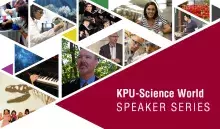
Metro Vancouver, B.C. – Whether it’s organic food or pipeline crude, modern science is more complex and collaborative than ever before, with some of the most significant research taking place among large teams of cooperating specialists.
If no one scientist can understand a research project fully, how can everyday people make decisions about scientific questions?
Dr. David P. Burns will discuss this and more in his upcoming talk on “citizen science” at Science World on Sept. 8. Here’s a preview:
Q: Why did you think this was an important topic to talk about?
Dr. Burns: Most people who take science classes don't become professional scientists. Science itself is highly specialized, and even professional scientists might have a layperson’s understanding of different scientific disciplines. For example, a physicist might have a similar understanding of contemporary epidemiology to that of a non-scientist. In short, most of the science education we conduct in grade schools and in undergraduate schools is undertaken by people who will use scientific methods and knowledge primarily outside of professional science. This means that most of us are citizens who study some science, rather than scientists in the traditional sense. The role of science in an everyday citizen's life is, therefore, arguably the most important educational goal institutions of science can undertake.
Q: What do you want people to learn?
Dr. Burns: There are two basic ideas I want to convey in this lecture. The first is to demonstrate how difficult it has traditionally been to truly understand the insight scientific knowledge can provide the average citizen. The second is to demonstrate some of the exciting new ways in which this is changing. It is, I argue, easier than it has even been to be a citizen scientist.
Q: How is this relevant to everyday people?
Dr. Burns: People make decisions every day that, properly understood, rely on scientific knowledge. Every time a person fills a prescription, goes on a diet or chooses what kind of car to buy, she’s making decisions that have significant scientific dimensions. Scientific knowledge does not provide answers to questions such as "should I take this drug?" but it does provide indispensable evidence with which to make a sound choice.
- - -
How can people be scientific without having to be a scientist? If your interest is piqued, join Dr. Burns, Kwantlen Polytechnic University (KPU) and Science World Sept. 8 at 7 p.m. to learn more.
Next week’s event is the third of a six-installment collaborative speaker series between KPU and Science World that aims to engage, entertain and educate guests with fascinating insights into the world of science. The first talks featured the internationally acclaimed Borealis String Quartet on music and science, and Dr. Kent Mullinix on sustainable food systems for the 21st century.
Dr. Burns has a Bachelor of Education in Secondary Education from the University of Alberta, as well as an M.Ed. and PhD in Educational Policy Studies from the same institution. His areas of specialization include the philosophy of education; professional ethics, and; moral, character, environmental and science education. He has worked as a high school teacher and educational consultant.
For more on the KPU-Science World speaker series, visit kpu.ca/scienceworld.
BEING SCIENTIFIC WITHOUT BEING A SCIENTIST
WHEN: Tuesday, September 8 at 7 p.m. Doors at 6:30 p.m.
WHERE: TELUS World of Science. 1455 Quebec St. Vancouver
INFO: The event is free and open to the public. Guests must register in advance at kpu.ca/scienceworld.
Science World British Columbia is a charitable organization that engages British Columbians in science and inspires future science and technology leadership throughout the province.
Kwantlen Polytechnic University has been serving the Metro Vancouver region since 1981, and has opened doors to success for more than 200,000 people. Four campuses—Richmond, Surrey, Cloverdale and Langley—offer a comprehensive range of sought-after programs, including business, liberal arts, science, design, health, trades and technology, horticulture, and academic and career advancement. Over 19,000 students annually have a choice from over 124 programs, including bachelor’s degrees, associate degrees, diplomas, certificates citations and apprenticeships. Learn more at www.kpu.ca.
Media contact:
Hayley Woodin
Media Specialist
t: 604.599.2883
c: 604.364.1288
hayley.woodin@kpu.ca
For more KPU news:
@KPUmedia
kpu.ca/newsroom
Flickr